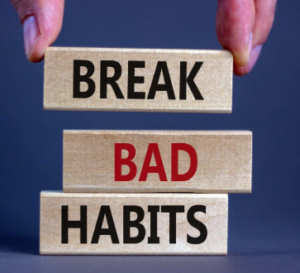We usually connect habits and repetition with the stuff we don’t love about ourselves—
smoking, stress, drinking, overthinking, or eating like a trashcan panda when emotions hit.
But here’s the deal: repetition doesn’t judge.
Your brain is always in full mimic-mode. It doesn’t ask,
“Is this good for us?”
It just records.
Where do you think the phrase birdbrain came from?
Repeat anything—good or bad, healthy or not—
a thought, a reaction, an action…
and if it’s repeated enough?
Boom. It becomes automatic.
That’s how your brain works.
It’s not personal.
It’s biology.
And no, this isn’t some woo-woo, new age thing.
It’s neuroscience—specifically neuroplasticity.
Your brain literally rewires itself based on what you keep doing.
Walk enough? You get better at walking.
Worry enough? Congrats—you’re now a professional worrier.
We follow the path of our most dominant thoughts.
What we think—and how often we think it—shapes everything.
Your brain builds what you practice.
Physically. Emotionally. Automatically.
And here’s what no one really talks about:
You repeat good stuff too.
Laughing with people you love.
Showing up to work (even work you hate).
Brushing your teeth. Hugging your dog.
All habits. All automatic.
Because you repeated them.
So stop acting like your brain only memorizes dysfunction.
It’s just running a system.
You’re the one feeding it.
Now yeah—changing a pattern can feel slow.
Especially when you’ve been running the same loop for years.
That’s when we lean on willpower—trying to force change.
But here’s the catch:
Willpower is conscious effort.
Most habits live in the subconscious.
You’re trying to rewire the basement from the front porch.
That’s why diets crash and burn.
They try to override deeply wired patterns with short-term rules.
They might work for a while…
but eventually, it’s back to business as usual.
And that’s where hypnotherapy steps in and says:
“You want to speed this up?”
Hypnosis works with your subconscious—the part of your mind where your habits actually live.
Instead of yelling affirmations in the mirror and hoping they stick,
hypnotherapy gives you access to the control room.
You don’t just repeat a new habit.
You install it.
It’s not magic.
It’s strategic focus.
Hypnosis puts your brain in a relaxed, suggestible state.
That’s where you rehearse better patterns:
🌀 Calm instead of chaos
🌀 Control over compulsivity
🌀 Confidence instead of “ugh, not this again”
And because your brain learns by repetition,
hypnosis helps new patterns stick faster.
You’re basically handing your brain a better loop—
on a silver platter.
So yeah. Patterns run your life.
Always have.
The good news?
You get to choose which ones you keep repeating.
And if you want the shortcut, hypnotherapy is it.
🧠 The system isn’t broken.
It’s just waiting for better instructions.
Give it something worth repeating.
👀 Curious how this works in real life? 978-398-4051 // info@BurlingtonHypnosis.com
Sources
Habits: A Repeat Performance – repetition forms habits through environmental cues. [more]
Brain Activity and Automaticity – repeated behavior becomes neurologically efficient. [more]
Cognitive Hypnotherapy for Depression – compares hypnotherapy to CBT in treating depression. [more]

 Introduction
Introduction
If you stick around long enough in any profession, you start to notice patterns. After 25 years in hypnotherapy, I’ve seen what separates the effective practitioners from those who just read a script and hope for the best.
Hypnotherapy isn’t about fancy inductions, deep baritone voices, or swinging watches (though, let’s be honest, the clichés are fun). It’s about connection, skill, and an ability to guide clients past their mental roadblocks without making them feel like passengers in the process.
So, what actually makes a hypnotherapist effective? Let’s break it down.
Art of Subtlety
A great hypnotherapist doesn’t bulldoze a client’s subconscious with heavy-handed, cliché driven suggestions. Instead, they plant ideas like seeds, letting the mind engage with them naturally. This means no robotic scripts that sound like they were right out of the instruction manual. Clients respond best when they feel like they’ve arrived at insights on their own.
An effective hypnotherapist knows how to guide without over-explaining. The more you spell everything out, the more conscious resistance you create. The best transformations happen when the client’s mind connects the dots in its own unique way.
Presence Over Performance
There’s a difference between being with a client and performing hypnosis at a client. People don’t come in looking to be impressed by your hypnotic acrobatics. They come in because they want relief, change, or at the very least, a break from the exhausting loop running in their minds.
Being an effective hypnotherapist means being present. It means paying attention to subtle shifts in breathing, tone, and micro-expressions. It means knowing when to pivot and when to stay quiet. The best hypnotherapists make clients feel safe enough to let their guard down, not by dazzling them, but by genuinely listening.
Science and Art
There’s a tendency in the hypnotherapy world to lean too far in one direction either by treating hypnosis as pure science (cold, clinical, research-based) or as pure mysticism (all intuition, no structure).
The truth is that the best hypnotherapists balance both. They understand the neuroscience of hypnosis, how it affects the brain, memory, and perception but they also know how to work intuitively, reading the client’s emotional and subconscious landscape in real time.
You can know every research study ever published, but if you don’t know how to apply it in a way that resonates with a human being sitting in front of you, it’s useless.
 Trust, Rapport, and Comfort
Trust, Rapport, and Comfort
If a client doesn’t trust you, they won’t fully engage with the process. It doesn’t matter how talented you are, skepticism and resistance will keep them tethered to their defenses.
Trust isn’t built by boasting about credentials or promising miracles. It’s built in the first few moments of interaction, how you actively listen to their story, how speak to them, how you explain the process, and most importantly, and how you make them feel heard.
Rapport is the bridge to trust. It’s not just about being friendly, it’s about genuinely understanding the client’s world, their concerns, and their goals. An effective hypnotherapist mirrors the client’s pace, language, and emotional state, creating a sense of familiarity and safety. When a client feels like they’re talking to someone who gets them, their defenses lower, and the real work begins.
A great hypnotherapist makes a client feel like they are in good hands not by over-explaining hypnosis, but by exuding a calm, confident, and non-judgmental presence that fosters connection.
Flexibility Over Rigidity
There’s nothing worse than a hypnotherapist who treats every client the same way. People have different personalities, triggers, and belief systems. What works wonders for one person might be completely ineffective for another.
An effective hypnotherapist knows how to adjust. Some clients need direct suggestions; others need metaphor and storytelling. Some need long, slow inductions; others drop into trance within seconds. The best practitioners don’t force a one-size-fits-all approach, they adapt.
You Don’t Need to “Fix” the Client
One of the biggest mistakes new hypnotherapists make is thinking they have to be the one to fix the client. But hypnosis isn’t about fixing, it’s about facilitating.
Clients aren’t broken. They don’t need to be repaired. They need to be guided into a state where they can access their own solutions. The most effective hypnotherapists don’t see themselves as the hero of the story. They are the tour guide, helping the client step into their own power.
Find the Funny
A little humor can dissolve tension faster than any relaxation script ever could. Too many hypnotherapists take themselves way too seriously, as if every session is some sacred, mystical event.
The reality? Clients are human. They feel nervous. They wonder if they’re “doing it right.” A well-placed joke or a lighthearted comment can instantly put them at ease, making the session more effective.
Conclusion
After 25 years, I can tell you this: the most effective hypnotherapists aren’t the ones with the flashiest techniques or the most prestigious credentials. They’re the ones who know how to create an experience that feels natural, personal, and effortless for the client.
They guide rather than dictate. They adapt rather than impose. They listen more than they talk.
Most importantly, they recognize that the real power of hypnosis doesn’t come from the hypnotherapist it comes from the client. The job of the hypnotherapist is simply to help them access it.
By: Paul Gustafson
Introduction
 Ever get the feeling your brain is running outdated software, where you find yourself hitting the snooze button ten times, munching midnight snacks, or dawdling like it’s an Olympic event? That’s because nearly 95% of what we do is orchestrated by our unconscious mind working silently in the background, controlling our habits and behaviors.
Ever get the feeling your brain is running outdated software, where you find yourself hitting the snooze button ten times, munching midnight snacks, or dawdling like it’s an Olympic event? That’s because nearly 95% of what we do is orchestrated by our unconscious mind working silently in the background, controlling our habits and behaviors.
Most people try repetition to exchange bad habits for good ones, but hypnotherapy gives you a faster, more efficient way like moving from dial-up to high-speed fiber optics in your head! With direct access to the subconscious mind, hypnosis can short circuit the normal path and speed up positive change, allowing you to drop old habits and build better ones easily.
Let’s delve into how habits develop at the subconscious level, why repetition is effective but slow, and how hypnotherapy is a science-based shortcut to permanent behavior change.
Subconscious Determines Habits
Imagine your subconscious as a huge warehouse where automatic reactions, learned associations, values and beliefs are shelved. Childhood experiences, cultural conditioning, and more shape our behaviors, many times without us even realizing it.
For instance:
- If you’ve linked sugar with comfort since childhood, you may have a hard time breaking the habit of emotional eating even when you know it’s bad for you.
- If you’ve been taught to fear failure, you may have difficulty creating confidence building behaviors such as goal setting or asserting yourself.
- If you were raised in a household where one or both parents were smokers you may also embrace this habit even though you understand the risks.
Traditionally, repetition has been the default method for reprogramming these unconscious habits. Neuroscience backs this up with the idea that “neurons that fire together, wire together.” In other words, repeating something again and again strengthens brain connections, so it becomes automatic after a period of time. But here’s the catch: it can take weeks or even months to cement a habit.
Fast Track to Better Days
Hypnosis accelerates habit formation by putting you into a very focused, receptive state linked with theta brainwave activity (the state in which deep learning takes place). The subconscious is more open to new suggestions in this state, so it is easier to swap negative habits for preferred alternatives. Unlike traditional habit creation, which relies on effort and repetition, hypnosis bypasses the critical, analytical part of your mind and speaks directly to the subconscious. Which is to say:
✅ Faster Habit Installation – Forget months of conscious reinforcement. Hypnosis facilitates easier installation of new habits that you want.
✅ Breaking Bad Associations – Hypnosis can retrain your brain’s emotional triggers, such as overeating due to stress or fear of failure causing procrastination.
✅ Boosting Motivation & Self-Control – Hypnosis affirmations can make you inherently want to be someone who enjoys exercising, eating well, or being focused without exerting coercion on yourself.
✅ Connecting Good Feelings to Healthy Habits – Hypnosis makes healthy habits fun, which more than anything else ensures your motivation.
Is Science Pro-Hypnosis?
 Most definitely! Research consistently supports the advantage of hypnotherapy in behavior modification and developing long-term habits. Stanford University Associate Chair of Psychiatry Dr. David Spiegel has done extensive research on hypnosis.
Most definitely! Research consistently supports the advantage of hypnotherapy in behavior modification and developing long-term habits. Stanford University Associate Chair of Psychiatry Dr. David Spiegel has done extensive research on hypnosis.
By his account, hypnosis alters brain function in areas that are engaged in the development of habits (e.g., prefrontal cortex and anterior cingulate cortex). Hypnosis also enhances cognitive control and self-regulation, enabling a person to more readily change deeply held habits. A meta-analysis published in the International Journal of Clinical and Experimental Hypnosis compared multiple studies and determined that hypnosis was highly effective at:
✅ tampering with automatic habits
✅ reducing stress
✅ improving concentration and self-control
Other neurology studies confirm that hypnosis heightens neuroplasticity, meaning your brain can rewire itself more quickly, speeding up the habit formation process.
Want to Explore Hypnosis?
Consult with a Certified Hypnotherapist. Private sessions can help with specific changes, from better sleep to stopping procrastination. Listen to Guided Hypnosis Recordings – Apps and audio classes reinforce new habits through frequent subconscious programming. Visualize & Mentally Rehearse – Hypnosis heightens visualization, so you can mentally rehearse and solidify new behaviors before they happen.
Closing Thoughts
While traditional repetition has the potential to rewire habits in the long run, hypnotherapy gives you a faster, more immediate route to subconscious transformation. Backed by cutting-edge research, hypnosis is scientifically validated to enhance neuroplasticity, self-regulation, and long-term behavior change. Whether you require more productivity, healthier habits, or stress reduction, hypnotherapy is a science-based method that easily brings about comfortable healthy change. Taking control never felt so good.
by: Paul Gustafson

 As a clinical hypnotherapist for more than 20 years, I’ve had the privilege to guide many of my clients toward transformative breakthroughs. While many approach hypnotherapy for specific goals such as quitting smoking, managing weight, or reducing stress, it is the unexpected benefits that ripple out from their sessions that always surprise both clients and me as well. These unintended, yet profoundly welcomed, shifts can include positive changes in emotional resilience, greater self-awareness, and even physical health in ways they may never have imagined.
As a clinical hypnotherapist for more than 20 years, I’ve had the privilege to guide many of my clients toward transformative breakthroughs. While many approach hypnotherapy for specific goals such as quitting smoking, managing weight, or reducing stress, it is the unexpected benefits that ripple out from their sessions that always surprise both clients and me as well. These unintended, yet profoundly welcomed, shifts can include positive changes in emotional resilience, greater self-awareness, and even physical health in ways they may never have imagined.
In this article, I’ll explore some of these hidden benefits, drawing on two decades of practice to illuminate how hypnotherapy can be a catalyst for profound, life-enhancing changes.
Heightened Emotional Resilience
Perhaps, one of the least spoken-about advantages of hypnotherapy is emotional resiliency. Many times, clients seek relief from a certain stressor or anxiety and find themselves leaving with an even more fortified inner toughness. That is where hypnotherapy does its work: gently accessing the subconscious mind, home of deeply imbedded beliefs and emotional patterns.
Hypnotherapy can enhance structuring of limiting beliefs, allow unresolved emotions to surface and be explored, offering sense of greater control to one’s inner landscape. By embracing routine hypnotherapy or meditation one becomes more resilient toward life’s many challenges. An example is someone who initially came hypnotherapy sessions for chronic work-related stress finding themselves entering high-pressure situations with calming confidence after a few sessions.
Improved Sleep
 While hypnotherapy does not always target sleep disorders, it generally helps a subject generally improve the quality of sleeping. Most sleep related disorders are related to stress, anxiety, and other overactive brain-related problems, in which hypnotherapy is quite effective in relieving.
While hypnotherapy does not always target sleep disorders, it generally helps a subject generally improve the quality of sleeping. Most sleep related disorders are related to stress, anxiety, and other overactive brain-related problems, in which hypnotherapy is quite effective in relieving.
Clients learn to quiet their minds and embrace a deeper sense of serenity through various relaxation and visualization techniques. Many find that the calming imagery from their sessions naturally replays in their minds as they drift off to sleep. This enhanced sense of well-being often leads to improved emotional and physical health, contributing to a better overall quality of life.
Enhanced Creativity and Problem-Solving
Creativity begins to flow when it disengages the conscious mind-to let the subconscious bring out those creative ideas and enhanced angles of perception. Hypnotherapy can be a useful tool fostering a client’s creative flow. Hypnotherapy routinely bypasses the analytical mind freeing up innovative thinking and fresh insight.
Past clients who happen to also be musicians, artists, and writers routinely report an enhanced creative flow because of their hypnotherapy experience. I would say that most clients experience unexpected freedom, clarity or relief unrelated to what they specifically came to fix with hypnotherapy.
Improved Physical Health
The impact of hypnotherapy on physical health often surprises clients. It certainly doesn’t replace medical care, but hypnotherapy compliments and often enhances conventional treatments through the decrease of stress and fostering of relaxation that is so important in general well-being.
Hypnotherapy can reduce the stressful anticipation of physical problems like discomfort in most instances which enhances personal control. Others have related the following: a decrease in blood pressure, improvement in digestion, and even quick recuperation from illness or injury once hypnotherapy enters their self-care routine.
Better Relationships
Indirectly, hypnotherapy can enhance personal relationships. It can soften self-limiting beliefs, emotional triggers, and offer improved perspective with unresolved conflicts, offering more clarity and compassion.
For instance, one client who couldn’t communicate well with his wife found out through hypnosis that as a child he had grown up feeling nobody listened to him. As he changed that pattern, he changed not only his inner talk but also how he related to his spouse.
Realizing Hidden Talents and Desires
 Hypnotherapy has the capacity to unlock areas a person may never have known or had forgotten existed. Hidden in the subconscious, deeper inside, lie the evolvement of hidden talents, desires, or dreams buried by routine and responsibility.
Hypnotherapy has the capacity to unlock areas a person may never have known or had forgotten existed. Hidden in the subconscious, deeper inside, lie the evolvement of hidden talents, desires, or dreams buried by routine and responsibility.
For one client, a middle-aged accountant, in this practice of visualization, he rediscovered the long-forgotten love of music; he started taking piano lessons and shortly thereafter, joined the local classic rock band, which unexpectedly improved his quality of life.
Increased Mindfulness
Hypnotherapy helps clients connect deeply with the present moment. They learn to observe their thoughts and feelings without judgment. This cultivated mindfulness often extends into their daily lives, enabling them to face challenges with greater confident clarity. For instance, this very anxious client learned how to anchor back into peacefulness by rehearsing experiences taken from their sessions. It wasn’t just the anxiety, which was significantly reduced, but also a new opened up leading to more consistent awareness and appreciation.
Confident Clarity
Hypnotherapy embraces self-trust and confidence resulting in enhanced intuition and inner wisdom. An example is one client who had great difficulty making a career change decision for quite a long period of time. Through hypnotherapy she started to hear that little voice within pointing in a specific direction filled with passion. In fact, the same client still views those sessions as a turning point for starting a fulfilling new chapter in her life.
Increased Productivity
The last advantage of hypnotherapy is that, often, it allows individuals to start more productively work in the direction of their goals. The path seems more direct, and the outcome seems much more attainable.
Routinely exploring the subconscious mind often leads to a more purposeful and enriching life because therein lies the true wish of the heart. One retiree, through hypnotherapy, relived his dream of serving overseas. It not only gave him the opportunity to experience his desire for a new adventure but also lifted his spirits and sense of purpose again.
Conclusion
Hypnotherapy is so much more than a means to fix a particular problem; it’s a gateway to self-discovery and change. Unexpected benefits ranging from improved creativity to better relationships prove just how interconnected our minds, bodies, and feelings truly are.
After all these years I am still impressed by the capacity we all have for growth and self-healing. The real magic of hypnotherapy is how it can offer specific relief, but how it can also open doors toward a more meaningful life. If you ever wondered what hypnotherapy can do for you, consider the unexpected-it just could hold the key to unlock your hidden potential.

 1 Winter Blues:
1 Winter Blues:
Hypnotherapy can also help combat seasonal affective disorder by literally rewiring thought patterns and then building a sense of warmth and well-being within.
2 Motivated and Energized:
Cold and darkness steal motivation. Hypnotherapy reinstates drive and consistency at work, during exercise, and in daily routines.
3 Improve sleep on long nights:
The winter disrupts the sleep patterns of millions of people. Hypnotherapy ensures deep, restorative sleep due to its calming action on the mind and stress reduction.
4 Stop Winter Comfort Eating:
Chilly weather along with holiday treats is the surest combination for overeating. Hypnotherapy can rein in cravings and support eating more mindfully to enhance healthier eating patterns.
5 Manage Stress:
Hypnotherapy offers clarity for the mind and complete relaxation while holidays are a time for chaos in planning, social obligations, and family gathering.
6 Boost Immunity and Mind-Body Healing:
When stressed, your immune system is weakened to make you more susceptible to cold and flu. Deep relaxation through  hypnotherapy encourages healthy immune function.
hypnotherapy encourages healthy immune function.
7 Ease winter aches and pains:
Cold weather exacerbates joint pain and stiffness. Hypnotherapy will modify your perceptions of such pain, decrease discomfort, and even help with physical relaxation.
8 Beat Cabin Fever:
Indoor confinement during this time can also foster irritability and restlessness. Hypnotherapy will help to reframe negative emotions to maintain an upbeat resilient mindset.
9 Focus and productivity:
Dark and dismal days result in foggy brains. Hypnotherapy sharpens you up for work, creativity or personal projects.
10 New Year‘s resolutions:
Most resolutions often fizzle out, while hypnotherapy cements motivation and good habits to ensure long-term success.

 Introduction
Introduction
 Trust, Rapport, and Comfort
Trust, Rapport, and Comfort
 Ever get the feeling your brain is running outdated software, where you find yourself hitting the snooze button ten times, munching midnight snacks, or dawdling like it’s an Olympic event? That’s because nearly 95% of what we do is orchestrated by our unconscious mind working silently in the background, controlling our habits and behaviors.
Ever get the feeling your brain is running outdated software, where you find yourself hitting the snooze button ten times, munching midnight snacks, or dawdling like it’s an Olympic event? That’s because nearly 95% of what we do is orchestrated by our unconscious mind working silently in the background, controlling our habits and behaviors.
 Most definitely! Research consistently supports the advantage of hypnotherapy in behavior modification and developing long-term habits. Stanford University Associate Chair of Psychiatry Dr. David Spiegel has done extensive research on hypnosis.
Most definitely! Research consistently supports the advantage of hypnotherapy in behavior modification and developing long-term habits. Stanford University Associate Chair of Psychiatry Dr. David Spiegel has done extensive research on hypnosis.
 As a clinical hypnotherapist for more than 20 years, I’ve had the privilege to guide many of my clients toward transformative breakthroughs. While many approach hypnotherapy for specific goals such as quitting smoking, managing weight, or reducing stress, it is the unexpected benefits that ripple out from their sessions that always surprise both clients and me as well. These unintended, yet profoundly welcomed, shifts can include positive changes in emotional resilience, greater self-awareness, and even physical health in ways they may never have imagined.
As a clinical hypnotherapist for more than 20 years, I’ve had the privilege to guide many of my clients toward transformative breakthroughs. While many approach hypnotherapy for specific goals such as quitting smoking, managing weight, or reducing stress, it is the unexpected benefits that ripple out from their sessions that always surprise both clients and me as well. These unintended, yet profoundly welcomed, shifts can include positive changes in emotional resilience, greater self-awareness, and even physical health in ways they may never have imagined. While hypnotherapy does not always target sleep disorders, it generally helps a subject generally improve the quality of sleeping. Most sleep related disorders are related to stress, anxiety, and other overactive brain-related problems, in which hypnotherapy is quite effective in relieving.
While hypnotherapy does not always target sleep disorders, it generally helps a subject generally improve the quality of sleeping. Most sleep related disorders are related to stress, anxiety, and other overactive brain-related problems, in which hypnotherapy is quite effective in relieving.
 Hypnotherapy has the capacity to unlock areas a person may never have known or had forgotten existed. Hidden in the subconscious, deeper inside, lie the evolvement of hidden talents, desires, or dreams buried by routine and responsibility.
Hypnotherapy has the capacity to unlock areas a person may never have known or had forgotten existed. Hidden in the subconscious, deeper inside, lie the evolvement of hidden talents, desires, or dreams buried by routine and responsibility.

 1 Winter Blues:
1 Winter Blues: hypnotherapy encourages healthy immune function.
hypnotherapy encourages healthy immune function.







